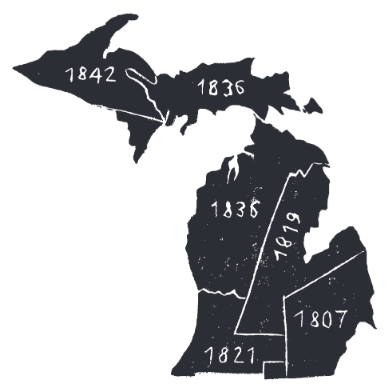This guide was created by the Decolonizing MSU Learning Community (LC) during the 2022-2023 academic year, led by Sarah Prior and Dustin Petty. Read more about Learning Communities at MSU.

We collectively acknowledge that Michigan State University occupies the ancestral, traditional, and contemporary Lands of the Anishinaabeg – Three Fires Confederacy of Ojibwe, Odawa, and Potawatomi peoples. In particular, the University resides on Land ceded in the 1819 Treaty of Saginaw. We recognize, support, and advocate for the sovereignty of Michigan’s twelve federally-recognized Indian nations, for historic Indigenous communities in Michigan, for Indigenous individuals and communities who live here now, and for those who were forcibly removed from their Homelands. By offering this Land Acknowledgement, we affirm Indigenous sovereignty and will work to hold Michigan State University more accountable to the needs of American Indian and Indigenous peoples.
Read more at aiis.msu.edu/land/

The boundaries of the state of Michigan resulted from several land cessions from 1807 through 1842, and at that time Native people were forcibly removed from their land. The land that MSU occupies is the ancestral, traditional and contemporary lands of the Anishinaabeg – the Three Fires Confederacy of Ojibwe, Odawa and Potawatomi peoples – that was ceded in the 1819 Treaty of Saginaw. The federal government often negotiated treaties with tribes under duress or in ways that legalized violent land seizures from Native people. The Indian encampment site on MSU’s campus is in the People’s Park courtyard between Wells Hall, Erickson Hall and the International Center. Read more.
Decolonizing the University is a faculty and graduate student learning community (LC) at Michigan State University founded by Sarah Prior and Dustin Petty in 2022. The LC explores the application of decolonization theory and practice to Michigan State University and other land-grant universities. LC members are interested in replacing colonial structures with practices that encourage the success and whole-person development of all students, faculty, and staff. Email Dustin Petty for information.
Decoloniality Dialogues (DD) Collective — an interdisciplinary and transnational group of educators, scholars, thinkers, and healers — invites educators, caregivers, and practitioners to activate unlearning practices that disrupt ideas of teaching and learning, and place more focus on dynamic and disparate forms of engagement. Email DD Collective for information.